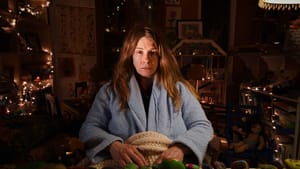Stay in the Loop
BSR publishes on a weekly schedule, with an email newsletter every Wednesday and Thursday morning. There’s no paywall, and subscribing is always free.
Time she stopped
EgoPo Classic Theater presents Samuel Beckett’s Rockaby

It is startling, almost 12 months to the day since our lives all changed, to see the lower half of a stranger’s face. To see it up close, in the real world, maybe two feet in front of your own. But here I am, alone on a South Philly back patio I accessed via an alley that I never even knew was there, and EgoPo Classic Theater’s production of Rockaby has begun and I am face-to-face with actor Melanie Julian. We are separated by a pane of glass, but face-to-face all the same.
Already, I am rattled.
Trapped in safety
One of the things the pandemic has taken away from us is our ability to visit other people’s homes. Most of us have been confined within our own four walls for so long that we’ve developed Stockholm Syndrome with our apartments and houses: we know we are trapped, but we also feel safe.
But as Rockaby begins and Julian opens the blinds that cover the pane of glass separating us I am staring into the well-lit home of someone I do not know. The room is filled with dolls and toys and drawings—the artifacts of a childhood untouched or unaffected by video games and streaming services—and it’s impossible to tell whether it was set up this way on purpose or whether this is the room’s natural state of being, but it is perfect all the same.
Seated in a rocking chair, Julian begins to rock back and forth, and each time she rocks forward her face is that much closer to mine. She is staring straight ahead and even though I know in my head it’s unlikely she can see me because I am seated in near-complete darkness and she is in a room filled with light, my heart thumps because it seems like the actor is looking at me, through me, not just into my eyes but into my soul. So much of Rockaby tells of a woman—presumably the selfsame woman in the chair although the narrative is delivered in the third person—staring out her window, searching first for “another like herself,” and then just “another living soul.” Once or twice, I avert my gaze because it is uncomfortable, sitting like that, her staring ever ahead as her face approaches and then retreats from mine. Am I that other living soul? Or has it just been so long since I’ve needed to confidently meet someone’s gaze that I’ve forgotten how?
Out-Becketting Beckett
Having taken Rockaby from the stage, where the window at which the woman is seated is imaginary, to the back room of a Philadelphia rowhome, makes it at once more real and more absurd (Rockaby is presented in three different locations, with three different actors, throughout its run). I wonder what Beckett would have thought. Would he have been angry he did not come up with this idea first?
Sitting there, rocking there, Julian says very little. The bulk of words performed in Rockaby are pre-recorded, with Julian joining only three of the lines, and commanding “more” between sections of the monologue. She does not stop rocking, not for a moment, and I know that in the original production it was supposed to seem as though the chair was rocking all on its own, the performer’s feet visible on the chair’s footrest rather than pushing against the ground to keep the movement going. Because I only see as much of Julian as the window permits, I cannot tell if she is propelling herself or if some otherworldly entity seems to be but the constant rhythm of the motion against the dimeter verse of the script is, if not frightening, then certainly unnerving.
A world through a window
It is neither hot nor cold outside, but I realize I have goosebumps. I am trying to process Beckett’s words and also my own feelings and I realize that this is a play about mortality when we have all been confronted with our own on a daily basis. It is a play about experiencing the world through what you can see out your window when so many of us have hardly left our homes. It is a play that repeats the words “time she stopped,” when, in a lot of ways, it has.
It is the perfect play for the pandemic age.
Image description: Actor Melanie Julian sits in a rocking chair, wearing a worn blue bathrobe. Her long light brown hair falls messily over her shoulders and her face has an exhausted expression. The dark room behind her is strewn with toys and children’s art, lit only with white string-lights.
What, When, Where
Rockaby. By Samuel Beckett. Directed by Damien J. Wallace and Lane Savadov. Through March 21, 2021, in three Philadelphia locations (Point Breeze, Passyunk Crossing, and East Oak Lane). www.egopo.org/rockaby.
Sign up for our newsletter
All of the week's new articles, all in one place. Sign up for the free weekly BSR newsletters, and don't miss a conversation.

 Jillian Ashley Blair Ivey
Jillian Ashley Blair Ivey